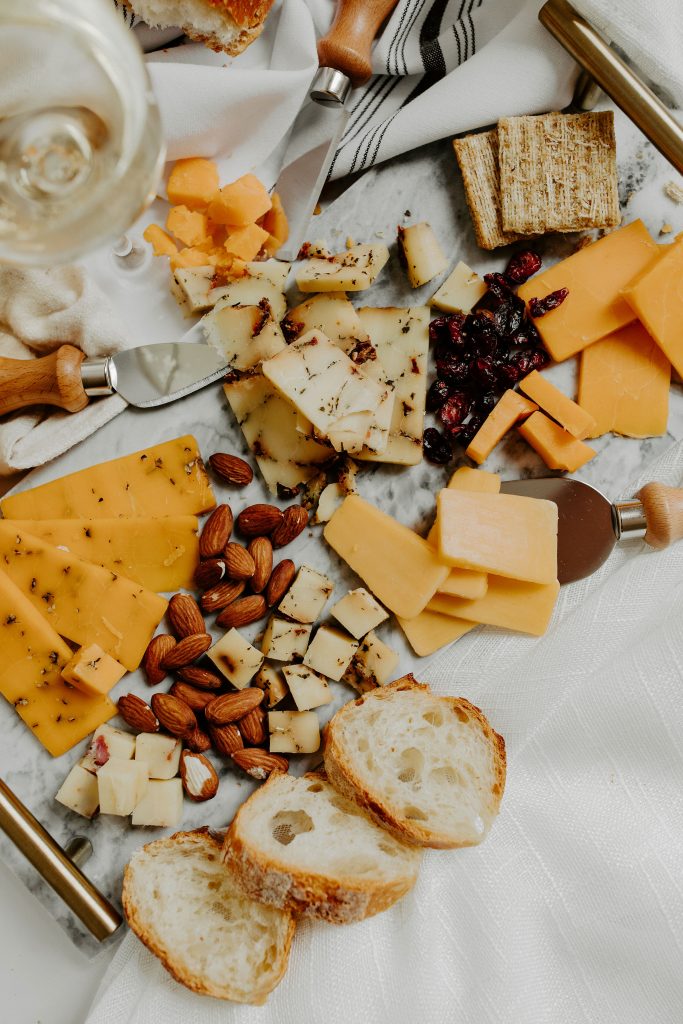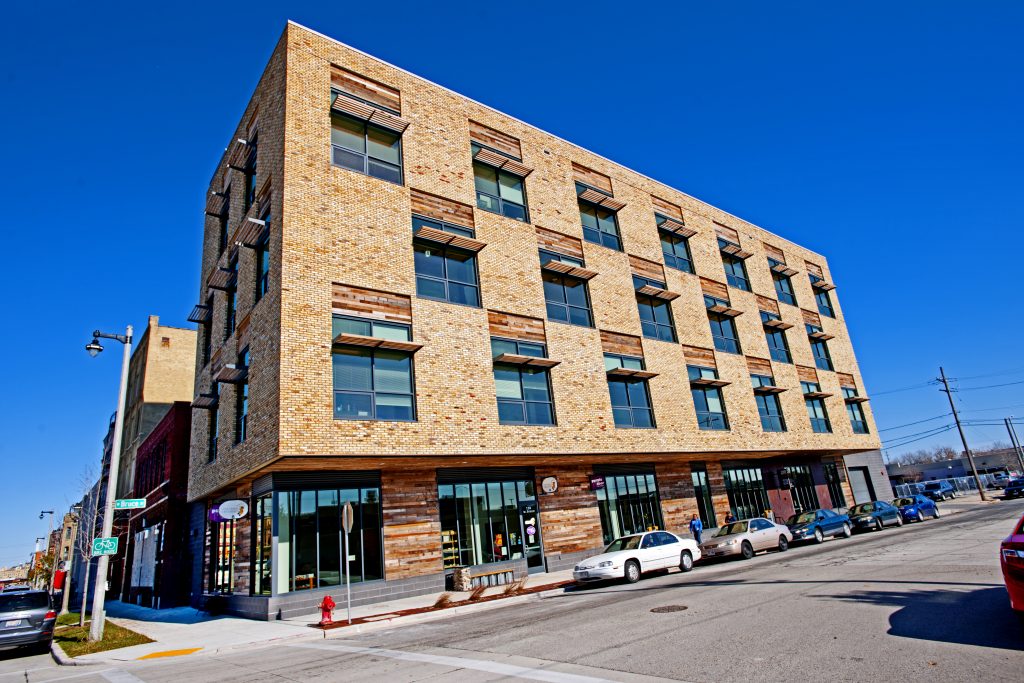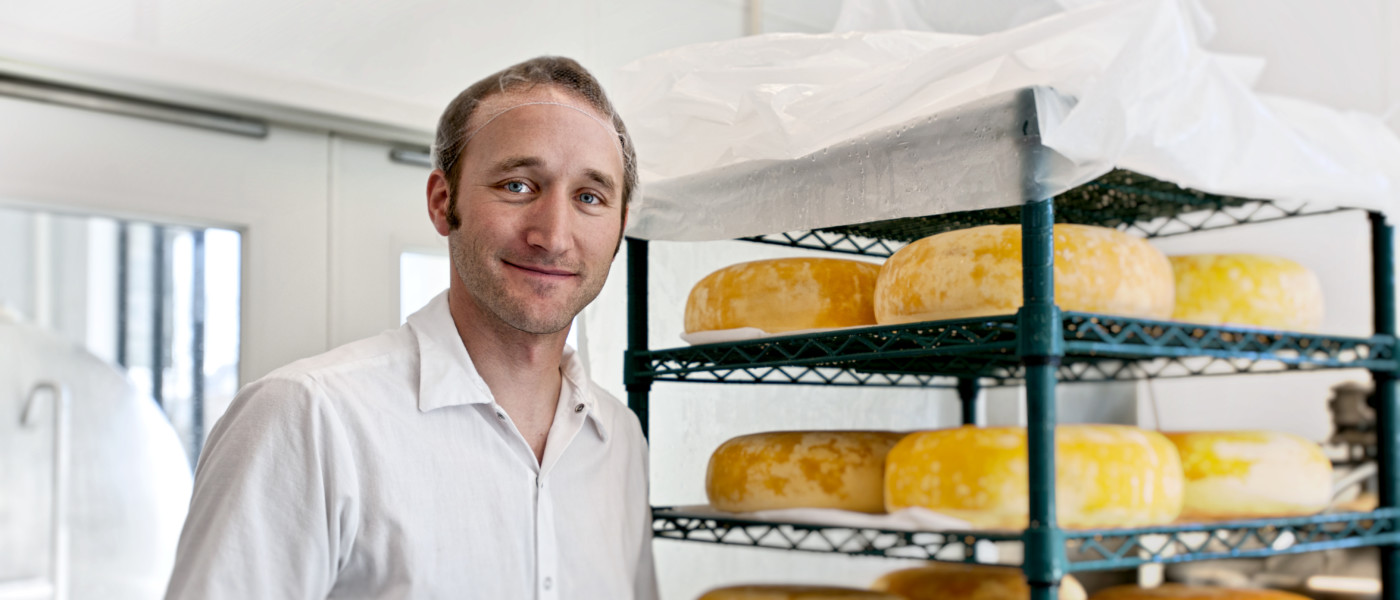It’s been about three years since Ron and Josie Henningfield began operating Hill Valley Dairy, where they make and sell small batch artisanal cheeses. Ron makes the cheese and Josie supports the business through sales, marketing and other business tasks. In addition, they have two part-time workers who help with the cheese making and delivery, as well as another part-time worker who helps with sales. The milk is supplied from Romari Farms, which is owned by Ron’s brother, Frank, who owns and operates the farm with his wife and kids. Romari Farms is a third-generation dairy farm, purchased in 1942 by Ron and Frank’s grandparents, who each came from farming families.
“Our goal has always been to strengthen the farm for the long run by making a value-added product and taking it directly to consumers,” Ron says. “We’re in a position where we get to communicate with our customers and share the farm’s story so consumers feel connected with their food. That brings a sense of pride back to the farm, to take a food directly to the customers and see their reaction and how they enjoy and appreciate the hard work and the quality of the milk and cheese that comes from our families’ farm.” Josie adds, “It’s been awesome to see people understand that they’re supporting more than one family by supporting a small family business.”

Hill Valley dairy cheese plate. Photo: Romari Farms
A typical week, Ron notes, goes like this: “Monday is a long day of cheese making at the creamery. Tuesday is a day of preparing orders and running deliveries. Wednesday, Thursday and Friday are a mix of more cheese deliveries to restaurants, retail shops and farmer’s markets. And throughout the whole week, it’s always a balance of managing to do the daily tasks of our own small business.”
Ron explains how he makes cheese:
“Every Sunday of the year, the milk from the dairy farm gets trucked to the creamery. Then, on Monday morning, I show up around 7 am and leave around 8 pm. Early in the morning, the milk flows into the cheese vats, which is the large kettle that I use for making cheese. I’m usually working with about 600 gallons of milk. First, I warm the milk up a little bit and I add the cheese cultures, which are bacteria that give the cheese its flavor. And the different cheeses I make–cheddar and gouda–use different flavors. There are a few more ingredients throughout the entire process, which is about seven hours from beginning to end.
The cultures are in the milk for about an hour. They start consuming the lactose there, and they start growing in the milk. The next ingredient I add is the coagulate, which some people also call rennet. This changes the milk from a semi-liquid state to a semi-solid state.
Then, I cut the semi-solid mass into little cubes, about a half inch by half inch, with a set of wires that I pull through the vat. These cubes, which are called curds, form alongside whey, which is the liquid that comes out of the curds. Over the next two to three hours, I stir the curds and whey with large paddles, and add a little heat. During those hours, the curds start to dry out and shrink. To separate the curds from the whey, I open a small valve on the cheese vat, and let the whey flow out of the vat. The curds stay at the bottom of the vat, and I continue to stir them. The last ingredient I add is salt, then I put the curds into block form or wheel form depending on if I’m making cheddar or gouda.”
Creating a strong relationship between the farm and the greater community is extremely important to Ron and Josie. “To me, being a family farmer is not just about providing for your own family; it’s about working hard and providing for other people’s families,” Josie says. “You provide a great product, whether that’s milk or meat or grains, and you’ve been able to provide for the families of the community that you live in. That’s been the core of our business.”
“We’re in a position where we get to communicate with our customers and share the farm’s story so consumers feel connected with their food.”
Educating customers about farming has been invaluable, and Josie has found that consumers are eager to understand the impact of supporting local farms. Ron agrees. “I can only make good cheese from good milk from the farm. And my brother can only produce good milk if he’s taking good care of his animals and taking good care of the land,” he explains. “I like to have people understand that they shouldn’t just be buying our cheese because we’re a local, small, family farm. If they love our cheese, it’s because everything goes back to what I just said: taking care of the animals, taking good care of the land and taking care of your family and everybody who is involved.”
Ron and Josie have created a strong bond between their rural community and downtown Milwaukee. Before starting Hill Valley Dairy, Ron was the cheesemaker and head manager at Clock Shadow Creamery, which opened in 2012 and was the first creamery in Milwaukee. Currently, Ron rents the creamery there on Mondays, and brings back the finished product to the farm. Clock Shadow has an open viewing room, and at certain hours, passerby can see the cheese being made. This process fascinates everybody, from people buying from the cheese shop at the front of the building to the late-night bar crowd.

The creamery where Ron makes the cheese in Milwaukee every Monday.
“We were able to bring something that normally people only see in rural areas to the heart of downtown Milwaukee,” Josie says excitedly. “We saw an amazing response from people who might have grown up outside of the city who were suddenly flooded with family memories and neat things they remembered about local farms they grew up around. And then on the flip side, there were all these people who had never been to a farm, and they were so excited to learn about Ron and the farm where he grew up, and these quiet and humble farmers that live on the outside of the city.”
Fostering the connection between rural life and Milwaukee has been extremely fulfilling. Josie remarks, “People [in our area] don’t always go visit the city, so we were finding this awesome opportunity to connect our friends, family, and customers here in rural, southeast Wisconsin with the city. It has been amazing to see how people have an interest in learning about one another and talking to one another. In my opinion, having transparency and education–that’s very much how we succeed and how we grow.”
Written by Ben Covell
Ben joined Farm Aid for three short weeks during August, before heading off to his senior year of college at Oberlin. Ben put his awesome writing skills to work interviewing farmers for our Farmer Hero column, learning about farming along the way.




